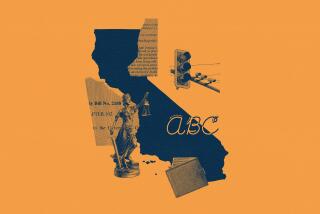Heady Sales or Hogtied Business? : Motorcycle Helmet Law Runs Up Against Liability, Harley Riders
- Share via
Wayne Crozier groans as he plucks a smooth black motorcycle helmet from a shelf and gives it a critical glance.
“I’m looking at them now, but come Jan. 1, I have no choice (but to wear one) if I want to ride. I’ll let the sucker collect dust till then,” said Crozier, a 34-year-old Harley rider and president of the Shaggers motorcycle club of Glendale. “But, hell, the one I’m going to buy isn’t going to do me any good anyway.”
Crozier is one of California’s more than 955,000 motorcyclists who will be required to strap on a helmet when the state’s mandatory motorcycle helmet law kicks into effect.
The law will dramatically boost helmet sales--at least in the short term. Although statistics are not kept on the number of motorcycle helmets sold in California, industry sources predict demand by the state’s bikers to reach 200,000 to 400,000 helmets in coming months.
But requiring nearly a million bikers to strap on the shiny fiberglass coverings before revving their engines could also mean an increase in product-liability suits. It’s a legal trend industry sources say has played a role in the demise of just about every domestic helmet manufacturer over the past decade.
“In the last 10 years there were 10 really major domestic helmet companies,” said Bob Jackson, editor of Motorcycle Product News, an international trade publication. Now there are only two small manufacturers. “What happened here in the United States is that insurance first became prohibitive and then unavailable.”
Liability insurance has become a necessity in an industry in which products are designed to prevent injuries and save lives and where consumers have become increasingly inclined to file suit when they don’t.
“There has been an enormous extension of liability against manufacturers, and verdicts have skyrocketed. The combination of the two makes certain products difficult to produce,” said Sheila Birnbaum, a New York attorney and an expert on product-liability issues.
Dean Fisher, senior vice president of Bell Sports, which manufactured helmets in the United States for almost 37 years, said there were as many as 55 domestic helmet manufacturers during the motorcycle explosion of the 1970s.
“It was primarily product liability that put them out of business. They couldn’t get insurance, and distributors and dealers don’t want to handle a product that’s not covered by insurance,” Fisher said.
Earlier this year, Bell Sports stopped manufacturing motorcycle helmets at its factory in Illinois after a decision was made to sell the motorcycle division and focus growth on the booming bicycle industry, Fisher said.
The virtual extinction of domestic makers has given rise to a generation of foreign helmet manufacturers making inroads in the U.S. market, although some are wary of the potential for liability themselves.
Representatives of several European manufacturers said their clients rely on international markets to keep them competitive and to ease the blow from exposure to U.S. liability problems.
Paul Zampierin, vice president of Bieffe USA, a marketing firm for Bieffe Helmets of Italy, said he believes that product-liability problems unique to the United States are what drove U.S. manufacturers out of business.
“The company I work for sells helmets internationally, so they’re also selling them to markets that do not have a product-liability problem, unlike the United States. The bottom line is that people in other countries don’t sue manufacturers,” Zampierin said.
Harry McPherson, an agent for Nolan Helmets, which also manufactures in Italy, said his company faces five to 10 product-liability suits at any one time.
“We actively restrict our sales in the United States because of product-liability problems. We sell only a fixed number of products because of the exposure,” McPherson said.
Some companies seem more accepting of the legal threat than others.
Catherine Fulmer of Arthur Fulmer Co., which manufactures in Italy and Taiwan, said last year that her company sold 35,000 helmets in the United States.
“We are very aware of product-liability problems, but we are in the business to sell helmets,” Fulmer said. “I’m sure there will be an increase in product-liability suits, but we’re interested in going after that business.”
Patrick Donnelly of Japan’s Shoei Safety Helmet Corp. said although he believes that many motorcyclists already own helmets, his company is boosting production in anticipation of an increase in demand.
“I don’t think we can get pulled into any lawsuits,” said Donnelly, Shoei’s director of sales and marketing. “There are people out there who don’t want a helmet law. They’re not against helmets per se, but instead the restrictions by the government of their basic freedoms.”
From a legal standpoint, product-liability suits have the potential to affect more than just the manufacturer, said Birnbaum in New York.
“If the helmet is defective in some way, then anyone in the chain of distribution could be held liable,” she said. “The retailer and distributor, who had nothing to do with the manufacturing of the product, could seek indemnification from the manufacturer if the product was improperly designed.”
For some California retailers who do business in the nation’s top motorcycle state, the fear of a liability suit dictates what merchandise they’ll offer customers.
“I only carry reputable brands of helmets. I will not carry a questionable product where the manufacturer does not carry liability insurance,” said Boyce Williams, owner of Accessories Unlimited in Newhall. “At Accessories Unlimited, we also will not sell a helmet to anybody unless we fit it onto their heads.”
Williams said that, at some point, he will dramatically increase his supply of motorcycle helmets, which generally cost between $79 and $350. He also will try to cater to Harley riders, he said. But he has yet to gear up because of the new law.
“What we’ve noticed is not so much a great surge in sales, but a great surge in interest. A lot of people are looking, thinking, talking and grumbling,” Williams said. “I think this whole thing will be much more palatable if the riders have a good selection of helmets--not only in terms of quality but also in terms of comfort.”
Jackson of Motorcycle Product News said the enactment of mandatory helmet laws in other states has tended to benefit companies that manufacture inexpensive helmets.
“Somebody who is forced to buy a helmet will go out and buy the least expensive helmet they can, because they’re not concerned about head protection. But they are concerned about not getting a ticket,” Jackson said.
Ultimately, donning a helmet in order to ride a motorcycle will be easier for some bikers than others.
“For the people who ride the fast, full-fairing Japanese motorcycles (with a fully covered engine), the image of a full leather suit and helmet with matching colors is very appealing to them and is part of the sport,” said Toby Rosner, 76, who fought the enactment of the helmet law.
“On the other hand, I think the Harley rider has his own image,” Rosner said. “The flowing hair and unadorned head are part of the image. I think the main issue with Harley motorcyclists is the freedom that nobody is going to tell them what to do. It’s the right to make their own choice.”
Ed Walker, owner of Ed Walker’s Engine & Frame Works, which specializes in Harley motorcycles, said he’s sold three helmets in the 20 years he’s been in business.
Walker said that, in the short term, he believes that the helmet law will increase helmet sales, and he plans to stock his store with 100 to 200 before Thanksgiving. But he said it is likely to decrease used bike sales, which will depress the used bike market and hurt sales of new motorcycles too.






